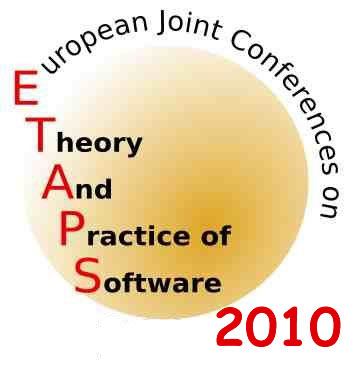News Tweets
- Loading...
Program 2010
The program for LDTA 2010 is now available. The accepted papers are:
- Stefan Holdermans & Jurriaan Hage. On the Rôle of Min. Typing Derivations in Type-driven Program Transformation.
- Daniela da Cruz, Pedro Rangel Henriques, & Jorge. GamaSlicer: an Online Laboratory for Program Verification and Analysis.
- Agostino Cortesi & Raju Halder. Dependence Condition Graph for Semantics-Based Abstract Program Slicing.
- Bas Basten & Jurgen Vinju. Faster Ambiguity Detection by Grammar Filtering.
- Adrian Johnstone & Elizabeth Scott. Tear-Insert-Fold Grammars.
- Jan Martin Jansen, Rinus Plasmeijer, Pieter Koopman, & Peter Achten. Embedding a Web-Based Workflow Management System in a Functional Language.
- Alain Giorgetti, Claude Marché, Elena Tushkanova, & Olga Kouchnarenko. Specifying Generic Java Programs: two Case Studies.
- Anya Helene Bagge. Language Description for Frontend Implementation.
- Paul Klint, Tijs van der Storm, & Jurgen Vinju. On the Impact of DSL tools on the Maintainability of Language Implementations.
- Margus Freudenthal. Using DSLs for Developing Enterprise Systems.
- Arjan v.d. Meer, Alexander Serebrenik, Mark v.d. Brand, & Albert Hofkamp. Formally Specified Type Checkers for Domain Specific Languages.
Call For Papers 2010
This is the Call For Papers for the Tenth Workshop on Language Descriptions, Tools and Applications (LDTA 2010)
LDTA is a two-day satellite event of ETAPS which will take place during ETAPS (March 27-28, 2010) in Paphos, Cyprus.
Scope
LDTA is an application and tool oriented forum on meta programming in a broad sense. A meta program is a program that takes other programs as input or output. The focus of LDTA is on generated or otherwise efficiently implemented meta programs, possibly using high level descriptions of programming languages. Tools and techniques presented at LDTA are usually applicable in the context of \"Language Workbenches\" or \"Meta Programming Systems\" or simply as parts of advanced programming environments or IDEs. The applications areas include, but are not limited to:
- Program analysis, transformation, generation and verification
- Implementation of Domain Specific Languages (both graphical and textual)
- Reverse engineering and reengineering
- Refactoring and other source-to-source transformations
- Application modelling (MDE, MDA, Software Factories, Software product lines)
- Grammar engineering / Grammarware
- Language definition and language prototyping
- Debugging, profiling and testing
LDTA is a well-established workshop next to other conferences and workshops on (programming) language engineering topics such as SLE and GPCE. LDTA is traditionally a forum where computer science theories are put to the test of real-world software engineering issues, for example by applying:
- context-free grammars to parser generation for real programming languages,
- attribute grammars to static analyzer and compiler generation,
- term rewriting to source-to-source transformation,
- action semantics to programming language implementation,
- model checking to software verification.
Submission Procedure and Publication
Submissions in the following categories are admissible:
- research papers,
- tool papers,
- experience papers
The final version of the accepted papers will, pending approval, be published in the ACM Digital Library and will also be made available during the workshop.
Each submission must:
- clearly and unambiguously state in which of the three categories it falls
- be original, i.e. not published or submitted elsewhere,
- contain a clear motivation,
- contain a thorough analysis of the claimed contributions (for example by comparing to related work),
- be written in less than 15 pages (research papers and experience reports), or less than 10 pages (tool papers)
- use the standard LaTeX article style (\documentclass[10pt]{article}, \usepackage{authblk} for affiliations)
Please submit your abstract and paper using EasyChair.
The authors of each submission are required to give a presentation at LDTA 2010. The authors of the tool papers are required to include an interactive demonstration in their presentations.
The authors of the best papers will be invited to write a journal version of their paper which will be separately reviewed and, assuming acceptance, be published in journal form. As in past years, this will be done in a special issue devoted to LDTA 2010 of the journal Science of Computer Programming (Elsevier Science).
Program Committee
- Claus Brabrand, IT University of Copenhagen, Denmark (co-chair)
- Pierre-Etienne Moreau, Nancy-Universitié & LORIA, France (co-chair)
- Uwe Aßmann, Dresden University of Technology, Germany
- Emilie Balland, INRIA, France
- John Boyland, University of Wisconsin, USA
- Giorgios Robert Economopoulos, University of Southampton, UK
- Magne Haveraaen, University of Bergen, Norway
- Nigel Horspool, University of Victoria, Canada
- Shan Shan Huang, Logic Blox, USA
- Johan Jeuring, Utrecht University, The Netherlands
- Ondrej Lhotak, University of Waterloo, Canada
- Shane Markstrum, University of California, USA
- Peter D. Mosses, Swansea University, UK
- Klaus Ostermann, Philipps-Universität Marburg, Germany
- Marc Pantel, University of Toulouse, France
- Elizabeth Scott, Royal Holloway, University of London, UK
- Eli Tilevich, Virginia Tech, USA
- Eelco Visser, Delft University of Technology, The Netherlands
- Joost Visser, Software Improvement Group, The Netherlands
- Tobias Wrigstad, Purdue, USA
Important Dates
| Abstract submission deadline: | (Friday) November 27, 2009 |
| Paper submission deadline: | (Friday) December 04, 2009 |
| Notification of acceptance: | (Friday) February 05, 2010 |
| Workshop dates: | during ETAPS, March 27-28, 2010 |

